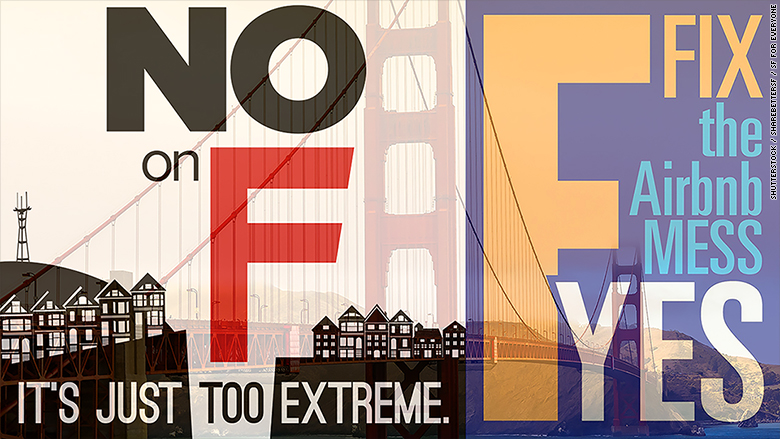
A fight over short-term rentals in San Francisco could have repercussions for tourist destinations around the world.
San Francisco residents will vote on a number of ballot propositions Tuesday that directly address the city's housing shortage and gentrification.
One of the most contentious is Proposition F, more commonly known as the Airbnb proposition, which cracks down on short-term rental properties.
San Francisco is in the middle of a housing shortage, fueled by an influx of well-paid workers at technology companies and a shortage of housing to accommodate them. The main argument for Prop F is that landlords are turning their units into short-term rentals -- further limiting the long-term housing that's available and pushing lower and middle class residents out of San Francisco.
Proposition F would limit all short-term rentals to 75 days a year. Currently the limit is 90 days when the primary resident isn't present, and unlimited if the home is occupied by the host at the same time.
The law would apply to all properties listed on services like HomeAway, VRBO and FlipKey but would have the biggest impact on Airbnb.
Since launching in 2008, Airbnb has become the go-to way to rent out homes or spare rooms for short-term use. Valued at $25 billion, it's one of the most valuable private companies in the world, according to PrivCo.
"We've lost somewhere between 10,000 and 12,000 housing units that have become full-time tourist rentals," said Dale Carlson of Share Better SF, a pro-Proposition F group.
Critics of Prop F say the measure is a misplaced attempt to fix a decades-long housing crisis. They claim many of the people renting out their homes on Airbnb are actually middle-class homeowners trying to make extra money to put toward their own ballooning housing costs.
"The heart of their numbers is the assumption that every room that's not currently on the market would otherwise be rented out to a person full-time," said Patrick Hannan, campaign manager for SF for Everyone, an anti Proposition F group. "Rents will not go down if Prof F is approved. Thousands of apartments will not suddenly become available."
According to a July investigation by the San Francisco Chronicle, only 350 San Francisco homes listed on Airbnb appear to be full-time rentals.
Airbnb has spent nearly $8 million to defeat the proposition, according to the San Francisco Ethics Commission. Supporters have raised less than a million dollars.
The specifics of the proposition might not matter to voters who are angry with tech companies. They see a vote for F as a vote against Airbnb and similar companies that are contributing to a rapidly gentrifying San Francisco.
The biggest hit to Airbnb's campaign likely came from Airbnb itself. A citywide ad campaign touted the $12 million in taxes the company pays with snarky suggestions for how to use it -- like keeping libraries open longer or adding bike lanes. It struck many as tone-deaf and smug -- and Airbnb pulled it the day after it launched.
Prop F is one of many attempts around the U.S. to regulate short-term rentals.
In Santa Monica, a strict new law bans residents from renting out entire homes for more than 30 days. People can still rent a spare room or in-law unit, but they must also be present, get a license and pay a 14% city tax.
Portland, Oregon, has new rules that requires short-term rental hosts to get permits and a safety inspection of their units.
Meanwhile, New York City has been ramping up enforcement of its existing short-term rental laws. In a bit of solidarity (and likely self-preservation), the Hotel Association of New York City donated $25,000 to support Prop F in San Francisco.
Activists in San Francisco doubt anything will improve without Prop F.
"If we lose, we'll do it again next year," said Carlson. He cited the similar challenges popping up across the U.S.
"That's going to put a crimp in their plans for an IPO."

